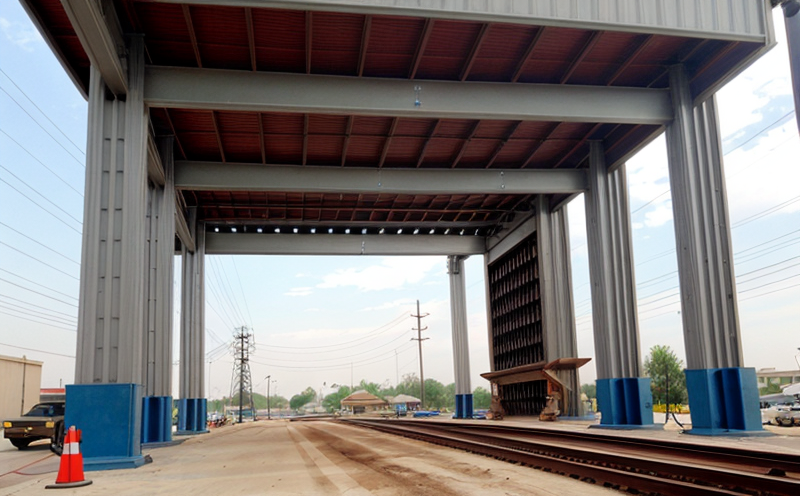ASTM D7248 Damage Tolerance Testing of Sandwich Composites
The ASTM D7248 standard is a critical part of the aerospace and aviation testing sector, particularly focusing on damage tolerance in sandwich composites. This service ensures that materials used in aircraft structures are robust enough to withstand impact and other forms of stress without compromising safety or integrity.
Sandwich composites are widely used due to their excellent combination of stiffness, strength, and weight reduction properties. These characteristics make them indispensable in the aerospace industry where every gram counts towards fuel efficiency and overall performance. However, these benefits come with a challenge: how to ensure that even after sustaining minor damage, such as dents or cracks, the structure remains safe and reliable.
The ASTM D7248 test aims at assessing this very aspect by simulating real-world scenarios where potential damages might occur during manufacturing, handling, or in-flight conditions. By following stringent protocols outlined in this standard, laboratories can provide data that helps manufacturers make informed decisions about material selection and design optimization.
Key aspects of ASTM D7248 include:
- Test Specimens: Typically, specimens are cut from the actual composite structure or representative samples. The choice depends on the specific application but always ensures that the testing reflects real-world conditions.
- Testing Equipment: Advanced machines capable of applying controlled loads and monitoring deformation accurately are used. This includes hydraulic presses, tensile testers, and specialized fixtures designed to replicate various types of loading experienced by aircraft structures.
- Data Collection: Extensive use of sensors embedded within or attached externally to the specimen allows for continuous monitoring throughout the test cycle. Parameters measured include strain distribution, deflection angles, fracture patterns, etc.
The results from ASTM D7248 testing serve multiple purposes:
- Quality Assurance: Ensures compliance with industry standards and regulatory requirements.
- Risk Mitigation: Identifies potential weaknesses before they become critical issues during operational phases.
- Design Optimization: Provides insights into material behavior under different loading conditions, aiding in improving future designs.
In conclusion, ASTM D7248 plays a pivotal role in ensuring the reliability and safety of sandwich composite materials used in aerospace applications. Its rigorous testing procedures help manufacturers produce safer aircraft while maintaining high performance standards.
Industry Applications
- Airframe Construction: Ensures structural integrity during manufacturing processes like bonding, drilling, and fastener installation.
- Vibration Testing: Simulates in-flight vibrations to assess how well the structure can handle these dynamic loads without sustaining unacceptable damage.
- Impact Resistance: Evaluates a composite's ability to withstand impacts from objects such as birds or hailstones, which are common occurrences during flights.
The results of ASTM D7248 tests provide crucial information for aerospace engineers responsible for designing safer and more efficient aircraft. By adhering strictly to this standard, manufacturers can ensure their products meet stringent quality controls necessary in the aviation industry.
Environmental and Sustainability Contributions
The use of ASTM D7248 damage tolerance testing contributes significantly to environmental sustainability efforts within the aerospace sector. Lightweight composite materials reduce fuel consumption by lowering aircraft weights, thereby decreasing CO2 emissions during flights. Additionally, these tests enhance safety margins, reducing the likelihood of accidents that could lead to catastrophic failures resulting in substantial carbon footprints.
Moreover, by identifying and addressing early signs of damage through rigorous testing, manufacturers can extend component lifespans without compromising performance. This not only reduces waste but also promotes recycling initiatives aimed at minimizing environmental impact throughout lifecycle management practices.
In summary, ASTM D7248 supports sustainable aviation practices by fostering innovation around material selection and design optimization, ultimately leading to greener skies through reduced emissions and enhanced operational reliability.
Use Cases and Application Examples
The application of ASTM D7248 damage tolerance testing extends beyond just compliance; it also supports various phases in the development lifecycle of aerospace products. Here are some specific use cases:
- Development Phase: Early-stage evaluations to identify potential weaknesses and inform design iterations.
- Manufacturing Quality Assurance: Continuous monitoring during production processes ensures that each unit meets specified quality parameters.
- In-Service Monitoring: Periodic inspections post-delivery help maintain optimal performance throughout the service life of an aircraft.
An example application involves testing composite panels used in fuselage sections. Engineers simulate various loads and environmental factors to determine if there are any areas prone to failure over time. Such insights guide adjustments needed for better durability without compromising weight or cost efficiency.





